Every year, thousands of people accidentally or intentionally take too much venlafaxine. It’s one of the most commonly prescribed antidepressants, but its overdose risk is often underestimated. Unlike some other medications, venlafaxine doesn’t just make you feel sick-it can shut down your nervous system. If you or someone you know has taken too much, knowing the signs and acting fast could save a life.
What Happens When You Take Too Much Venlafaxine?
Venlafaxine works by increasing serotonin and norepinephrine in the brain. That’s why it helps with depression and anxiety. But when you overdose, those chemicals go into overdrive. The brain can’t handle the flood. Your body goes into a state called serotonin syndrome, which can turn deadly within hours.
Even a dose slightly above your prescription-like 500 mg when you normally take 150 mg-can trigger serious symptoms. In some cases, people have overdosed on as little as 200 mg, especially if they’re smaller, older, or taking other medications. There’s no safe "accidental" overdose threshold. The line between therapeutic and toxic is thin.
Key Symptoms of Venlafaxine Overdose
Recognizing the signs early is critical. Symptoms usually appear within 4 to 6 hours after ingestion, but they can start as early as 30 minutes. Here’s what to watch for:
- Fast or irregular heartbeat (over 120 beats per minute)
- High blood pressure that spikes suddenly
- Shaking, muscle stiffness, or twitching
- Confusion, agitation, or hallucinations
- Sweating, fever above 104°F (40°C), or flushed skin
- Nausea, vomiting, or diarrhea
- Seizures or loss of consciousness
These aren’t just side effects-they’re warning signs your body is failing. Serotonin syndrome can progress to seizures, organ failure, or cardiac arrest. If you see even two of these symptoms together, treat it like a medical emergency.
Why Venlafaxine Is More Dangerous Than Other Antidepressants
Compared to SSRIs like fluoxetine or sertraline, venlafaxine has a higher risk of overdose toxicity. Why? Because it affects two neurotransmitters, not just one. It also has a narrow therapeutic window-the difference between the right dose and the dangerous dose is small.
Studies show that venlafaxine overdoses are more likely to cause severe outcomes than other antidepressants. A 2023 analysis in the Journal of Clinical Toxicology found that 18% of venlafaxine overdose cases required intensive care, compared to just 6% for SSRIs. Deaths from venlafaxine overdose have doubled since 2015, mostly due to misuse, accidental mixing with other drugs, or suicide attempts.
It gets worse if you combine venlafaxine with alcohol, opioids, or other antidepressants. Even a small amount of alcohol can amplify the risk of heart rhythm problems. Mixing it with tramadol or certain migraine meds can push serotonin levels into lethal territory.
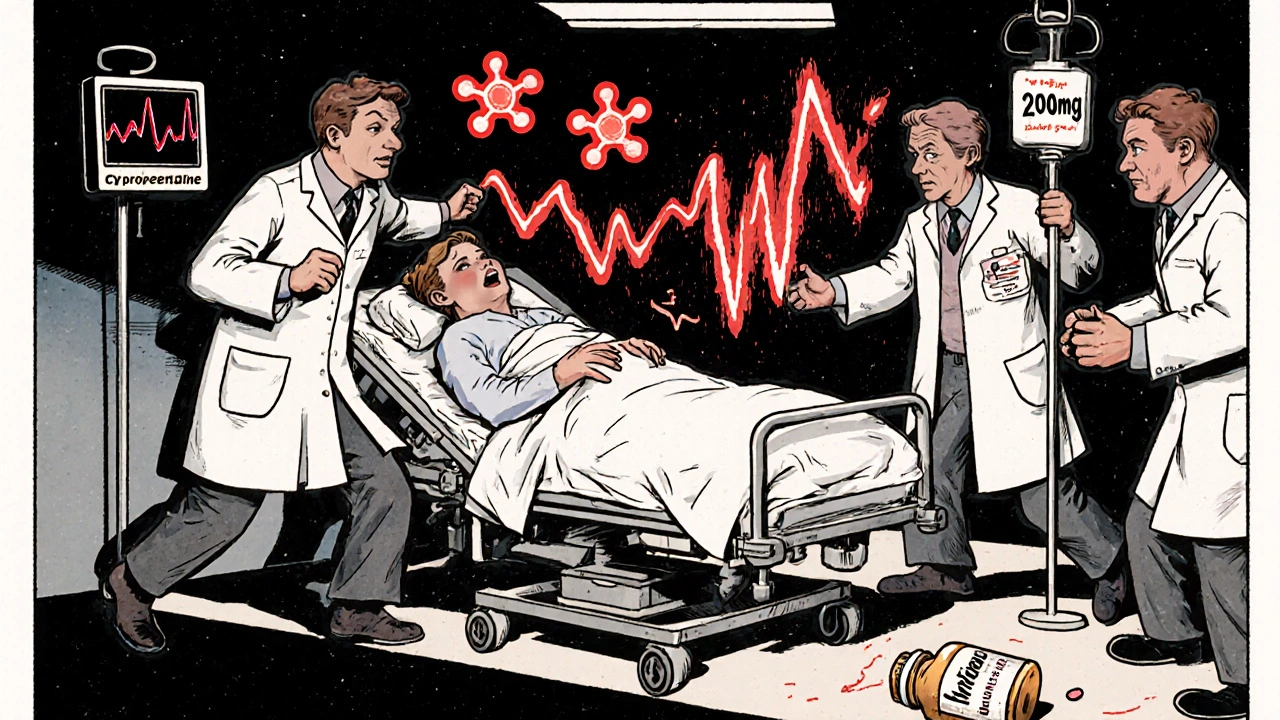
What to Do If Someone Overdoses on Venlafaxine
Time is everything. Don’t wait for symptoms to get worse. Don’t try to make them vomit. Don’t give them water or activated charcoal unless a medical professional tells you to.
Call emergency services immediately. In the U.S., dial 911. In the UK, call 999. In Australia, dial 000. Tell them exactly what was taken, how much, and when. If you have the pill bottle, bring it with you.
While waiting for help:
- Keep the person awake and sitting up if possible.
- Monitor their breathing and pulse. If they stop breathing, begin CPR.
- Do not leave them alone.
- Do not give them anything to eat or drink.
Emergency rooms are equipped to handle venlafaxine overdoses. They’ll monitor heart rhythm with an ECG, give IV fluids, and use medications like cyproheptadine to block serotonin. In severe cases, they may need to sedate the patient or put them on a ventilator.
Long-Term Risks After Surviving an Overdose
Surviving an overdose doesn’t mean you’re out of danger. Even after treatment, people can develop lingering problems:
- Heart rhythm abnormalities that last for days
- Neurological damage from seizures or lack of oxygen
- Depression or suicidal thoughts that worsen after the crisis
- Memory issues or brain fog
Some patients need weeks of follow-up care. A 2024 study in Psychiatry Research found that 31% of people who survived a venlafaxine overdose required psychiatric hospitalization within the next month. The trauma of the overdose itself can trigger deeper depression.
This is why follow-up care is non-negotiable. If someone overdosed on purpose, they need mental health support-not just detox. If it was accidental, they need a medication review to prevent it from happening again.
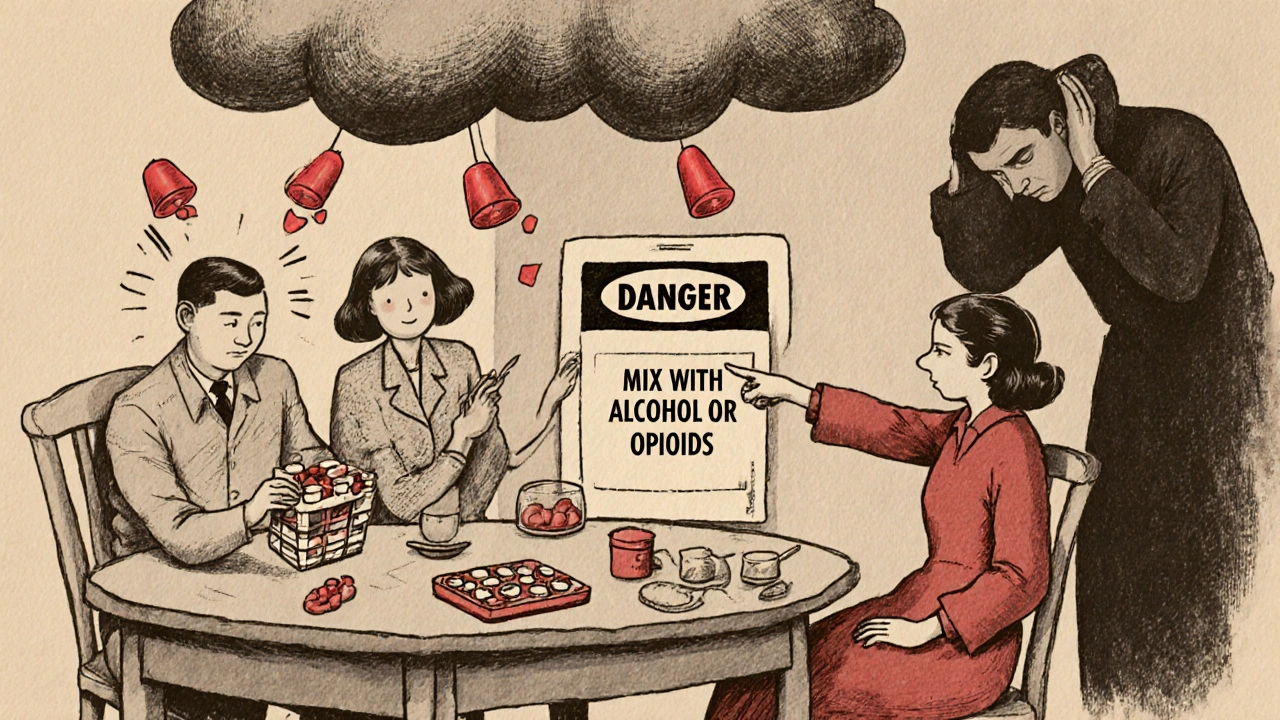
How to Prevent a Venlafaxine Overdose
Prevention starts with smart habits:
- Never change your dose without talking to your doctor. Even adding one extra pill can be dangerous.
- Store pills in a locked box if others live in your home, especially children or teens.
- Use a pill organizer with alarms. Missing doses can lead to doubling up later.
- Keep a list of all medications you take, including supplements. Share it with every doctor you see.
- Never mix venlafaxine with alcohol, sleeping pills, or painkillers unless your doctor says it’s safe.
- Ask your pharmacist about drug interactions before filling any new prescription.
If you’re feeling worse on venlafaxine, or if you’re thinking about stopping, talk to your doctor. Don’t quit cold turkey. Withdrawal can cause dizziness, nausea, and electric-shock sensations. Your doctor can help you taper safely.
When to Seek Help Before It’s Too Late
You don’t have to wait for an overdose to happen. If you’re experiencing any of these, reach out now:
- Thoughts of self-harm or suicide
- Feeling unusually agitated, restless, or paranoid
- Heart palpitations or chest tightness
- Unexplained sweating or fever
- Loss of appetite or trouble sleeping that won’t go away
These aren’t "just side effects." They’re signs your body is struggling. Call your doctor. Go to urgent care. Text a crisis line. You don’t have to wait until you’re in crisis to get help.
Can you die from a venlafaxine overdose?
Yes. Venlafaxine overdose can be fatal, especially when doses exceed 10 times the normal amount. Death usually comes from heart rhythm disturbances, seizures, or respiratory failure. The risk increases with age, pre-existing heart conditions, or mixing with other drugs. Prompt medical treatment greatly improves survival chances.
How much venlafaxine is considered an overdose?
There’s no single number, because toxicity varies by person. A dose over 600 mg is considered potentially life-threatening. But people have died from as little as 200 mg, especially if they’re elderly, have liver problems, or took it with other substances. The average prescribed dose is 75-225 mg per day. Anything beyond that should be treated as a medical emergency.
Does activated charcoal help with venlafaxine overdose?
Activated charcoal can help if given within 1-2 hours of ingestion, but only under medical supervision. It’s not a cure, and it doesn’t work for everyone. In many cases, doctors skip it because venlafaxine is absorbed too quickly. The priority is stabilizing vital signs, not removing the drug from the gut.
How long does venlafaxine stay in your system?
Venlafaxine has a half-life of about 5 hours, but its active metabolite lasts up to 11 hours. Most of it leaves the body in 24-48 hours. However, its effects on the nervous system can linger for days. That’s why monitoring after an overdose often lasts 24-72 hours, even if the person seems fine at first.
Can you overdose on venlafaxine by accident?
Yes. Accidental overdoses happen often. Common causes include doubling up on doses due to memory issues, taking it with another antidepressant without knowing the interaction, or misreading the label. Elderly patients and those on multiple medications are at higher risk. Always use a pill organizer and keep a medication list.
Final Thoughts: This Isn’t Just About Pills
Venlafaxine overdose isn’t just a medical issue-it’s a mental health crisis. Many overdoses happen because people feel hopeless and believe there’s no other way out. Others happen because the medication wasn’t explained well, or because side effects were ignored.
Medications like venlafaxine can be lifesaving. But they’re not harmless. They require respect, monitoring, and open communication. If you’re taking it, know the risks. If you love someone who is, learn the warning signs. And if you’re struggling, reach out. You don’t have to face it alone.
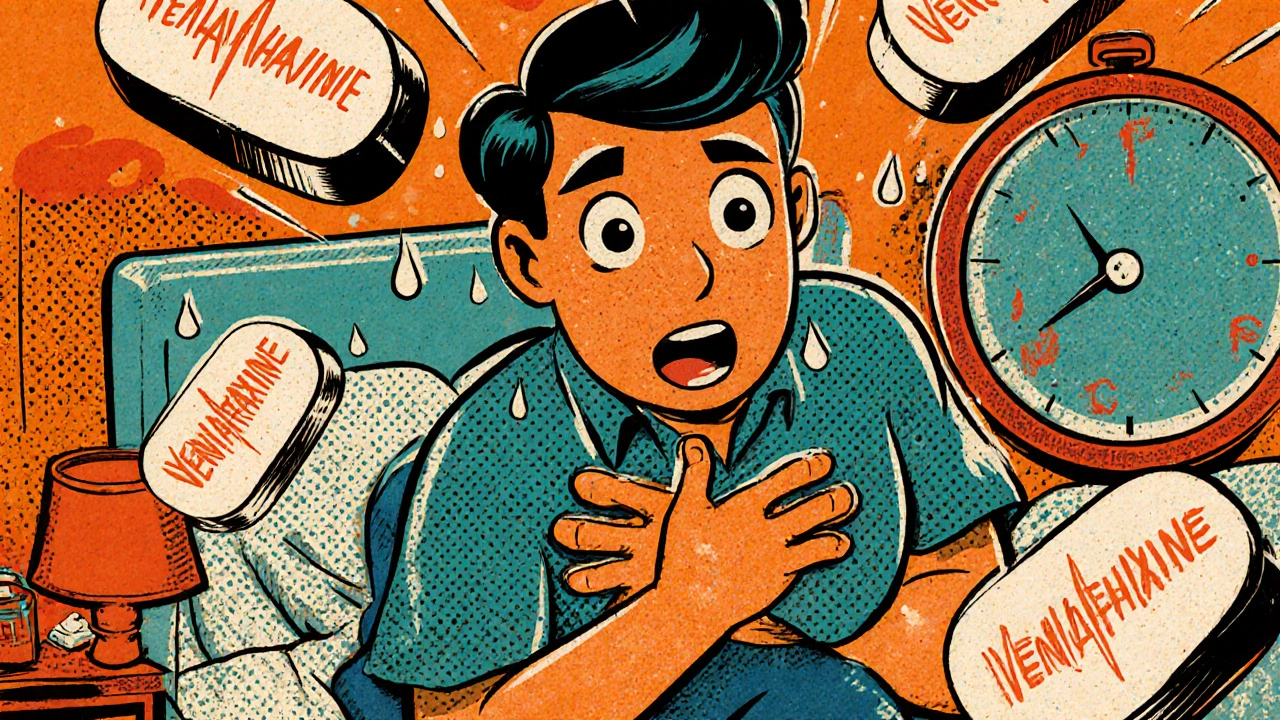
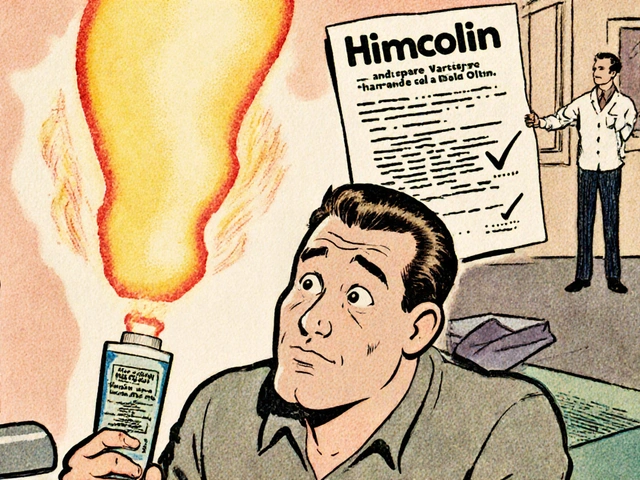

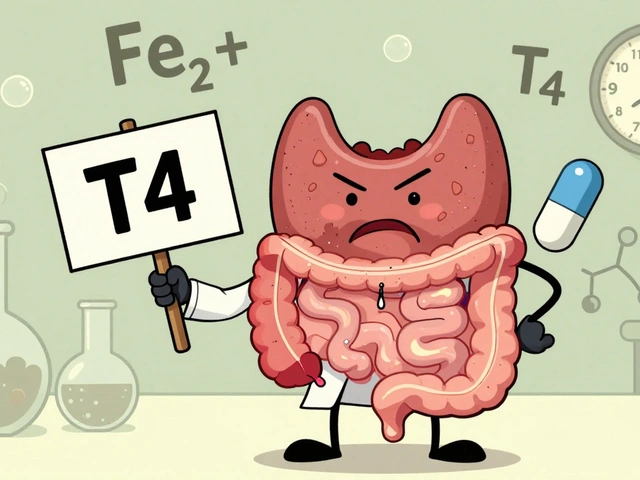
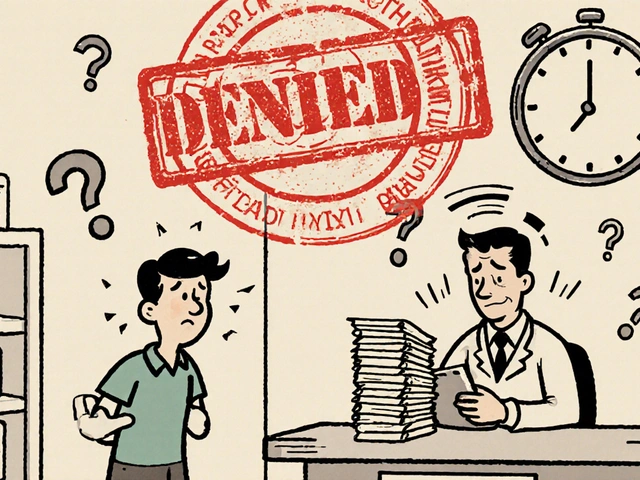
15 Comments
Thanks for this. I’ve been on venlafaxine for 3 years and never realized how thin the line is. I keep my pills in a locked box now. 🙏
Of course it’s dangerous-Americans can’t even spell ‘serotonin’ without a typo. You people treat meds like candy. We had a system in the 80s. Now? Chaos.
Let me just say-this is one of the clearest, most urgent breakdowns of venlafaxine risks I’ve ever read. The serotonin syndrome details? Spot on. The 2023 toxicology stats? Cited correctly. The warning about mixing with tramadol? CRITICAL. If you’re on this med, read this twice. Then show it to your prescriber. And if you’re a clinician? Print this out. Tape it to your wall.
Of course the article mentions ‘therapy’-because everyone knows the real problem is that people won’t just ‘take responsibility’ anymore. Back in my day, we didn’t need pill organizers-we had discipline. And we didn’t call 911 for a ‘slight overdose’-we just… didn’t take extra pills.
Did you know the FDA secretly approved venlafaxine because Big Pharma paid off 3 senators? And the ‘half-life’ they quote? Fake. The real half-life is 72 hours-they’re hiding it so you’ll keep buying. I’ve seen the documents. The ECG monitoring? It’s just to track your heart rate for the AI surveillance system. Don’t trust them.
my doctor never told me about the alcohol thing. i thought a beer was fine. oops. thanks for the wake-up call.
Actually, the 2023 Journal of Clinical Toxicology study? They used flawed statistical models-sample size was too small, and they didn’t control for polypharmacy properly. Also, ‘200mg can kill’? That’s sensationalist. I’ve seen 1500mg survive with no sequelae. It’s not the dose-it’s the individual. Your article’s tone is alarmist, not evidence-based. And why no mention of CYP2D6 polymorphisms?!
This is important. I’ve had patients come in with tremors and confusion after doubling up-no one knew it was venlafaxine. Please share this with anyone you know on antidepressants. Knowledge saves lives. No drama. Just facts. And care.
I’m from India, and here, many people buy venlafaxine over the counter. No prescription. No warning. I’ve seen three cases in my community. This post should be translated and shared in local languages. Thank you for writing it so clearly.
My cousin took 400mg thinking it was ‘stronger’-he ended up in ICU for 72 hours. He’s fine now, but he won’t touch meds without a therapist. This isn’t just about pills-it’s about loneliness. We need more support, not just warnings.
As a medical professional, I commend the clarity and accuracy of this post. The emphasis on immediate emergency response and contraindications with other CNS depressants is clinically sound. I will be sharing this with my residents and patients. Thank you for the thoroughness.
Good info. I just wish more doctors explained this before prescribing.
While the medical details are accurate, one must consider the cultural context: in many societies, mental health is still stigmatized, and people do not seek help until it is too late. The real tragedy is not the drug itself, but the silence that surrounds those who suffer. The pill is merely the symptom of a deeper malaise-a society that rewards productivity over peace, and performance over presence. We must address the root, not just the reaction.
you’re not alone. if you’re reading this and thinking about ending it… please text someone. even me. i’ll reply. you matter. 💙
They say ‘don’t mix with alcohol’-but what about kombucha? I’ve heard it has trace ethanol. Is that a threat? What about fermented foods? Are we being poisoned by kimchi now? I need a flowchart. And a lawyer. And maybe a bunker.
Write a comment